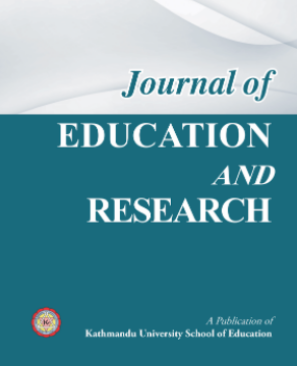
Examination Anxiety and Its Association With Socio-Demographic Variables Among Adolescent Students in Nepal
Original Article
Journal of Education and Research, Volume 13, Issue 1, 2023, 27-42, https://doi.org/10.51474/jer.v13i1.662
Publication date: Mar 27, 2023
Views: 816 | Downloads: 466
How to cite this article
APA
In-text citation: (Tharu, 2023)
Reference: Tharu, R. P. (2023). Examination Anxiety and Its Association With Socio-Demographic Variables Among Adolescent Students in Nepal. Journal of Education and Research, 13(1), 27-42. https://doi.org/10.51474/jer.v13i1.662
Reference: Tharu, R. P. (2023). Examination Anxiety and Its Association With Socio-Demographic Variables Among Adolescent Students in Nepal. Journal of Education and Research, 13(1), 27-42. https://doi.org/10.51474/jer.v13i1.662
Vancouver
In-text citation: (1), (2), (3), etc.
Reference: Tharu RP. Examination Anxiety and Its Association With Socio-Demographic Variables Among Adolescent Students in Nepal. Journal of Education and Research. 2023;13(1):27-42. https://doi.org/10.51474/jer.v13i1.662
Reference: Tharu RP. Examination Anxiety and Its Association With Socio-Demographic Variables Among Adolescent Students in Nepal. Journal of Education and Research. 2023;13(1):27-42. https://doi.org/10.51474/jer.v13i1.662
AMA
In-text citation: (1), (2), (3), etc.
Reference: Tharu RP. Examination Anxiety and Its Association With Socio-Demographic Variables Among Adolescent Students in Nepal. Journal of Education and Research. 2023;13(1), 27-42. https://doi.org/10.51474/jer.v13i1.662
Reference: Tharu RP. Examination Anxiety and Its Association With Socio-Demographic Variables Among Adolescent Students in Nepal. Journal of Education and Research. 2023;13(1), 27-42. https://doi.org/10.51474/jer.v13i1.662
Chicago
In-text citation: (Tharu, 2023)
Reference: Tharu, Ramesh Prasad. "Examination Anxiety and Its Association With Socio-Demographic Variables Among Adolescent Students in Nepal". Journal of Education and Research 2023 13 no. 1 (2023): 27-42. https://doi.org/10.51474/jer.v13i1.662
Reference: Tharu, Ramesh Prasad. "Examination Anxiety and Its Association With Socio-Demographic Variables Among Adolescent Students in Nepal". Journal of Education and Research 2023 13 no. 1 (2023): 27-42. https://doi.org/10.51474/jer.v13i1.662
Harvard
In-text citation: (Tharu, 2023)
Reference: Tharu, R. P. (2023). Examination Anxiety and Its Association With Socio-Demographic Variables Among Adolescent Students in Nepal. Journal of Education and Research, 13(1), pp. 27-42. https://doi.org/10.51474/jer.v13i1.662
Reference: Tharu, R. P. (2023). Examination Anxiety and Its Association With Socio-Demographic Variables Among Adolescent Students in Nepal. Journal of Education and Research, 13(1), pp. 27-42. https://doi.org/10.51474/jer.v13i1.662
MLA
In-text citation: (Tharu, 2023)
Reference: Tharu, Ramesh Prasad "Examination Anxiety and Its Association With Socio-Demographic Variables Among Adolescent Students in Nepal". Journal of Education and Research, vol. 13, no. 1, 2023, pp. 27-42. https://doi.org/10.51474/jer.v13i1.662
Reference: Tharu, Ramesh Prasad "Examination Anxiety and Its Association With Socio-Demographic Variables Among Adolescent Students in Nepal". Journal of Education and Research, vol. 13, no. 1, 2023, pp. 27-42. https://doi.org/10.51474/jer.v13i1.662
ABSTRACT
Examination anxiety is a combination of physiological, over-arousal, tension, and somatic symptoms along with worries, dread, fear of failure, and catastrophizing that occurs before or during the examination and is a major problem for students. Therefore, this study aims to assess the level of examination anxiety and its association with their selected socio-demographic variables among adolescent students in secondary schools in Nepalgunj, Nepal. A cross-sectional design was used, and 150 adolescent students were selected from selected secondary schools using a simple random sampling technique. The multinomial logistic regression (MNLR) model was adopted to assess the statistically significant factors associated with examination anxiety. Among 150 adolescent students, only 7.3% had no anxiety, more than half (i.e., 54.0%) had healthy anxiety, and 38.7% had unhealthy anxiety. The fitted MNLR model reveals that male students are 1.21 times more likely to have healthy examination anxiety than female students as a reference to no anxiety. Furthermore, the students whose parents expect high scores are 3.25 times more likely to have healthy anxiety than those whose parents do not expect high scores as a reference to no anxiety. The research reveals that male students have higher levels of examination anxiety than female students, and students whose parents expect an excellent score are more likely to experience healthy anxiety than students whose parents do not expect a high score.
KEYWORDS
REFERENCES
---
LICENSE
This work is licensed under a Creative Commons Attribution 4.0 International License.
